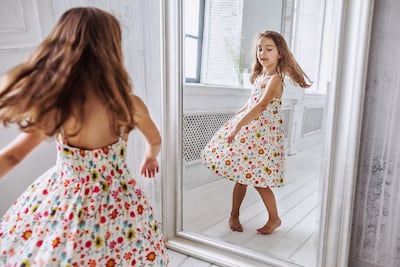Once upon a time, candid family memories were captured by film cameras and stored in photo albums on bookshelves or coffee tables within the home. These days they are staged, posted on Instagram Stories and saved as “Highlights”, where hundreds of thousands of strangers can view them.
Since the beginnings of social media, posting images of children for public consumption has been a topic of debate – one that has been reopened with the news that Facebook is applying the brakes on its version of Instagram for children, even while recent viral TikTok challenges continue to feature child influencers.
on posting images of her older children on Instagram
The Walk Challenge, for example, entails a user to walk towards the camera (which is set on 0.3x speed) to the sound of Saucy Santana’s Walk. Many parent influencers, including popular UAE blogger Karen Wazen, took part in this challenge with their children.
On the other end of the spectrum, supermodel Gigi Hadid shared an open letter on Twitter earlier this year explaining why she doesn’t publicly share images of her young daughter.
“To the paparazzi, press and beloved fan accounts, you know we have never intentionally shared our daughter's face on social media," the letter says. "Our wish is that she can choose to share herself with the world when she comes of age, and that she can live as normal of a childhood as possible, without worrying about a public image that she has not chosen.”
An Instagram poll of 300 users found that 34 per cent believe that sharing their children's images on social media is only part of the new normal and an extension of our transition to digital lifestyles. The other 66 per cent believe a line has been crossed, and that it could be harmful and unethical.
“Parents often warn their children about the risks of social media, however, they often ignore their own advice when they themselves constantly post pictures and videos of the everyday goings on of their children and families,” says Carolyn Yaffe, a psychotherapist at Medcare Camali Mental Health Clinic.
“When young people are growing up routinely seeing and posting photos of themselves, they are being taught this is normal, and they may develop poor boundaries when it comes to keeping things and situations private. Oversharing may become the norm.”
psychotherapist, Medcare Camali Mental Health Clinic
Those who oppose the prospect of exposing children on social media often say that young children, including infants, are used as props in a blogger's desire for social media stardom. They’re also wary of their capacity to make an informed decision about consent, and whether or not they understand that their images are being shared across the internet and beyond, sometimes for profit.
However, many parents contend that as their children’s guardians, it is their right and responsibility to make these decisions, among others, on their child's behalf, and how they may decide to share images of their children publicly is a private matter.
Designer and mother Maha Gorton, a Dubai resident, says that while she doesn’t feel comfortable sharing every minute of her children’s lives, she does sometimes feature her older children in her social media content and emphasises that she always asks their permission first. “If they say ‘no’, it’s a no. And if I am making money from a post that they’re in, they get a cut,” she says.
Yaffe says there are positives to familiarising older children with social media apps. “Many young people may find it easier to talk and socialise with peers after connecting with them first [online]. They also can use social media to have influence through social networking – bringing positive change through fundraising and promoting social awareness. Also, it is a great way for young people to stay relevant on current events and issues around the world,” she says.
While older children may be more aware of ideals such as consent and privacy, some children who are too young to own or operate a smartphone nonetheless have their own social media accounts, managed by their parents. Amina Smadi, 5, for instance, who has modelled for Level Shoes, Farfetch and Bloomingdale's Middle East, has more than 18,000 followers on Instagram.
“We started with her Instagram when she was three years old,” her mother, Vusula Shukorova, tells The National. “She loved taking photos, dressing up, and putting make-up on. She sees herself on social media pages, advertisements for online shopping sites and feels happy when her friends, and people outside recognise her. She enjoys it a lot.”
According to Shukorova, Amina even chooses the brands she works with. “Amina making her own choices and learning from her experiences will help her succeed faster at early stages,” says Shukorova. She says having a social media presence has helped her daughter become tech-savvy from a young age.
Early exposure to social media may nonetheless kick-start long-term obsessions with apps such as Instagram, says Yaffe. “The most common negative factor with young people using social media is it can lead to an addiction, and the submersion into a virtual world delays their emotional and social development.”
In addition to affecting their abilities to form social relationships, spending hours on social media can cause young users to make social comparisons. “This can literally cause a young person to feel miserable about their own lives. They can become depressed anxious and moody, as they may believe the lives of their friends are better than their own – even if these representations are often unrealistic,” explains Yaffe.

Down the line, there are further consequences of allowing children to become too comfortable with social media, especially when they consume potentially explicit and violent content unsupervised. “Over time, they become desensitised,” says Yaffe. “Believing these images and/or behaviours are normal will adversely affect current and future personal relationships in a negative manner.”
At the end of the day, when parents post their children’s milestones, personal family experiences and humorous moments online, their intentions may be harmless, but Yaffe advises them to think twice before clicking the share button.
“They do this not to be mean or spiteful, but often think what the children are saying or doing is funny and relatable to others who have children of similar ages. It is important to be mindful that anything you post online leaves a permanent trail that may follow your children for a long time to come.” She highlights that social media posts can unwittingly lead to bullying at school and can even eventually land on the screens of college admissions officers.
“Posts that are not made within the child’s control can be disrespectful and can adversely impact the child,” she says. “Before posting, parents need to ask themselves how they would feel if it was them in the photo instead.”

